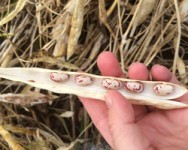Event Details
Date
September 17, 2015
Time
5:15 PM - 8:00 PM
Location
Paul Stein & Sons Farm
Caledonia, NY 14423
Cost
$10.00 CVP enrollee
(additional attendee $10.00 ea.)
$15.00 non-CVP enrollee
Registration includes a light supper. Contact Carol MacNeil.
Host
Cornell Vegetable ProgramCarol MacNeil
585-313-8796
email Carol MacNeil
2015 NYS Dry Bean Growers Field Meeting
September 17, 2015
Join us for the NYS Dry Bean Growers Field Meeting at Paul Stein & Sons Farm in Caledonia where the black bean variety strip trial will be available for viewing. In addition, there will be reports and discussion on insect and disease management, and progress on breeding improved dry bean varieties.
A top concern of the NYS dry bean industry for many years has been variety development and evaluation. This year a large strip trial of six new and standard black beans was planted on Paul Stein's farm. Preliminary observations will be reported and growers can view the varieties. Yield and quality data will be collected in the fall and winter. A major concern, in addition to yield, is keeping dry bean pods off the ground, and high enough to avoid losses during harvest. Progress on this goal will be reported by Bean Breeder Phil Griffiths, Cornell.
Sclerotinia white mold caused significant losses in some fields in 2014, and this wet season has growers concerned. Sarah Pethybridge, Cornell, will report on fungicide resistance she found on Western NY farms last fall, and on alternative, effective fungicides that are available. She will also report on bacterial infection that showed up in a few fields. Western bean cutworm populations have been steadily increasing in NYS in recent years. For the first time moth catches at many trap sites exceeded the threshold of concern. Some growers applied insecticides. There will be discussion on the current and potential impact of this new pest. What's New from Industry will give growers an opportunity to hear from their agribusiness associates.
The meeting will begin at the bean field located just past the golf course, at the southwest corner of Church St/Iroquois Rd and Barks Rd/Wheatland Center Rd in Caledonia. Use caution parking because of traffic! Later the meeting will move to Paul Stein & Sons Farm Shop located at 112 Wheatland Center Rd.
1.0 DEC recertification credits in categories 1a, 10, 21, and 23 will be available as well as CCA credits.
Cost: Enrolled in the Cornell Vegetable Program - $10; Not enrolled in the CVP - $15. Preregister for supper by Monday, September 14 by contacting Carol MacNeil. If you have special needs, call a week ahead so we can accommodate you.
Thank you to our event sponsors: Empire Tractor, Genesee Valley Bean Company, Goya Foods, Java Farm Supply, New York Bean LLC, and Treasure Valley Seed Company.
And thanks to the NYS Dry Bean Industry for supporting 2015 dry bean research!



































